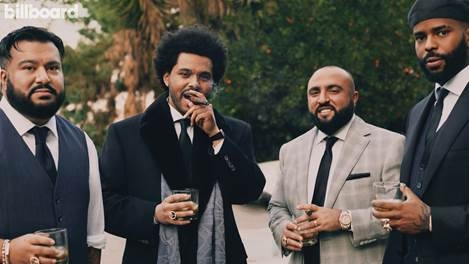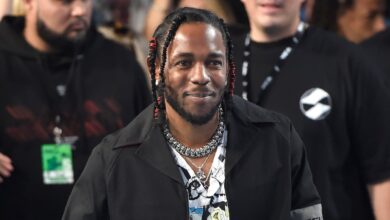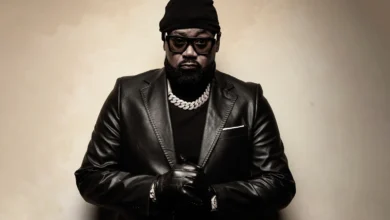The Weeknd On The Crew That Boosted Him From ‘Basically Homeless’ To The Super Bowl

“What are you talking about?” asks the man in the pinstriped suit. “About me?”
The conversation in question is, in fact, about a nearby Los Angeles recording studio. But much as the sun will rise in the east and set in the west and all roads lead to Rome, so too do all discussions among this group ultimately return to the man in the pinstripes. “Hi,” he says, reaching for a handshake. “I’m Abel.”
Abel is Abel Tesfaye, a quiet charmer who makes small talk about his holiday plans, remembers my name and apologizes when, just once, he interrupts while I’m talking. Abel Tesfaye is also, of course, The Weeknd — the sometimes-brooding, always-intriguing, silk-voiced underground R&B golden child turned pop prince.
In the suit, a fur-collared overcoat and diamond stud earrings for today’s photo shoot, he certainly looks the part — albeit one very different from the role he’s played with the dedication of a method actor over the past year. In music videos, late-night appearances and awards show performances for his blockbuster album After Hours, Tesfaye appeared with a mangled face and wore a blood red jacket — a charismatic sociopath inhabiting an eerie horror movie world equal parts Halloween and Fear and Loathing in Las Vegas
Tesfaye, 30, didn’t create it alone. He was joined every step of the way by the three equally sharp-dressed men chatting with him now on the patio of a Hollywood Hills mansion. Together, they are the brain trust of XO Records, the four co-founders of the label that has been synonymous with The Weeknd since he blew up out of Toronto in the early 2010s with a dark, relentlessly carnal strain of electronic-laced R&B.
The compact, gregarious man in the gray plaid is their de facto leader: Wassim “Sal” Slaiby, 41, The Weeknd’s manager and founder/CEO of management company SALXCO. Partnered with parent company Live Nation, SALXCO oversees a roster of roughly 20 artists (including French Montana, Doja Cat, Bebe Rexha, Ty Dolla $ign and M.I.A.) and about the same number of heavyweight producers. Some of the latter, like Metro Boomin and London on Da Track, work with a wide network of artists in hip-hop and beyond (including, often, SALXCO’s own); the rest, like Illangelo and DaHeala, essentially function as an in-house production team for The Weeknd.
The stylish, precise man in the black three-piece is La Mar C. Taylor, 30, XO creative director, founder of the Toronto youth talent incubator Hxouse and companion to Tesfaye since they met in high school economics class half a lifetime ago. The quiet man in the navy is Amir “Cash” Esmailian, 37, the teddy bear of the group; he co-manages The Weeknd with Slaiby, runs his own small management company, YCFU, and carries two cellphones — each with a different service provider, so he never misses a work call.
In a year when a pandemic brought much of the industry to a halt, these four men — all immigrants or sons of immigrants to Canada — not only pushed forward, but thrived. Their decision to stick to After Hours’ March release kicked off a year in which the album and its omnipresent lead single, “Blinding Lights,” dominated the charts while Tesfaye dominated virtual performances with his unwavering cinematic vision. And as the music business confronted a historic reckoning with racial justice, the diversity that has always powered SALXCO and XO — among their staff, constellation of artists and the Starboy at its center — set an example other companies are scrambling to emulate.
“Our producer Ali Gatie is Iraqi. M.I.A. is Sri Lankan, Nav is Indian, Abel is Ethiopian, Belly is Palestinian, I’m Lebanese,” says Slaiby. “Cash is Persian. La Mar is Jamaican. [SALXCO executive vp] Lindsay Unwin is Canadian. You’ve got the United Nations over here. That’s how it’s been for almost 20 years.”
They may look like the ultimate industry insiders now, but Tesfaye, Slaiby, Esmailian and Taylor succeeded in 2020 for the same reason they have since first convening 10 years ago as scrappy Toronto upstarts: Their tight, familial bond is the foundation for their success, not the other way around. They’ve counseled Tesfaye out of a bad early management deal and through his crossover to the pop mainstream. They’ve guided him to statement-making career highs, like his upcoming 24-minute halftime performance at the Super Bowl on Feb. 7 — a “Rubik’s cube of problems,” as Taylor puts it, that took six months of Zoom calls and email chains to sort out. They talk every day, play basketball twice a week and spend holidays together.
And when the going gets tough — as it did when The Weeknd received no 2021 Grammy nominations despite the commercial and critical success of After Hours — they band together, hunker down and push forward. “I know deep down in my heart that everyone would have been successful in their own realm if we’d never met,” says Tesfaye, nodding at his friends. “But us together — [what we’ve created] wouldn’t have happened without every single one of us in this room. All of the decisions I make, I don’t make without these three people here.”
“We surrounded ourselves with people who thought they knew everything and almost literally ruined our chances,” explains Tesfaye. Slaiby’s more pragmatic approach — “You get what I’m good at, and I tell you where to go for everything I’m not good at,” he says — appealed, and he and Esmailian extricated Tesfaye from his bad deal. They became The Weeknd’s co-managers, and shortly thereafter, the four men founded XO.
Early on, they figured out that taking chances — and operating on their own timeline — often made sense. The Weeknd’s “whole mysterious aesthetic,” as Taylor puts it, meant his music had to speak for itself. “I think that’s really what captivated everyone and catapulted Abel into the stratosphere,” Taylor continues. That buzz soon translated into big potential paychecks, but the XO crew didn’t jump at them: When an Australian promoter offered a $160,000 gig, they passed on it and others like it, opting instead to play clubs around Canada. “I knew how important it was to build the touring business,” says Esmailian. “At that point, we could have gone to step four or five, but I knew we had to start at step one. We were doing 500-person venues, but there were 2,000 people outside trying to get in.”
When major labels inevitably started circling, that groundswell became leverage. Among those interested were Republic Records co-founders and brothers Monte and Avery Lipman. “They came to Toronto, like, 10 times,” says Esmailian. “These guys are not running a small company — and going to Toronto, you’ve got to deal with customs — but they just kept showing up.”
“When you come across someone as gifted as Abel, you do everything and anything to hitch your wagon to their success,” says Monte Lipman, “because you know this kind of artist has an opportunity to change the world.” But the Lipmans weren’t solely compelled by his music; Monte calls the XO team “as competitive as anyone I’ve ever worked with,” praising “their expectations, loyalty and wolf pack mentality.”
Republic’s tenacity resonated with The Weeknd’s team, as did the fact that the Lipmans ran a family business. “You feel that in the company,” says Slaiby. “Everyone cares.” In the fall of 2012, XO entered a distribution and strategic partnership with Republic and its parent company, Universal Music Group. “Even just getting music on iTunes and Apple Music, we weren’t fully familiar with that, and they were,” says Esmailian. “Same with radio. They provided the structure.” The deal gave XO independence and Tesfaye ownership of his masters — now a clause Slaiby insists on for any artist contract. “If you’re 70 and want to retire, selling 50% might be a good deal,” he says. “But I definitely vote to own your own shit all day.”
Within six months, Republic’s muscle had paid dividends: Without a radio hit, The Weeknd was headlining venues like London’s 20,000-seat O2 Arena. His team wondered how much more massive these shows could be if he was actually on top 40 radio; still, Tesfaye was cautious. “I didn’t even know if I wanted to cross over at that time,” he says. “A lot of artists that succeed in the underground world, they’re scared to take that leap. I felt that way.”
But after disappointing sales of his 2013 debut studio album, Kiss Land, Tesfaye realized he wanted more — and Republic provided him the perfect boost into the pop mainstream. “Love Me Harder,” a duet with labelmate Ariana Grande, became his first hit on the Billboard Hot 100, peaking at No. 7. (It wasn’t just corporate synergy either: In October, they reunited on her album positions.) Five months later, Republic made his “Earned It” the linchpin of its Fifty Shades of Grey soundtrack — and a No. 3 solo hit.
“To me, ‘Earned It’ is the best crossover song I could’ve ever had,” says Tesfaye, “because it feels like a Weeknd record, but it also feels like it’s transcending. It felt fresh and it felt new and it felt pop.” He’d found a mainstream niche without abandoning his sound, one which defined his subsequent albums, 2015’s Beauty Behind the Madness and 2016’s Starboy. Both went to No. 1 and had tours averaging $1.1 million a night — quite a difference from the days when, Esmailian recalls, “we’d finish a tour and be down $200,000.”
“In the beginning, we went for broke,” says Taylor. “Abel put all of his money back into the production.”
“He has never been driven by money,” adds Esmailian.“I didn’t know what having money really felt like,” admits Tesfaye. “I don’t know what it feels like to lose money if I never had it. Even to this day with the label, it’s like, ‘Guys, I will put my own money into this music video. It’s happening.’ ”
Around that time, Tesfaye became one of only 13 artists to ever replace themselves at No. 1 on the Hot 100 (when “The Hills” overtook “Can’t Feel My Face”) and the guys — who had been living at the SLS Hotel in Beverly Hills for the better part of a year — officially moved to Los Angeles.
Here, they could finally enjoy the trappings of success: money, sports cars and mansions — Tesfaye’s in the Kardashian-strewn enclave of Hidden Hills, his three buddies just down the 101 in Encino and Echo Park. But they weren’t quite ready to kick back by their pools. “Honestly,” says Taylor, “with every project it feels like we’re just getting started.”
On Nov. 25, 2019, Tesfaye got behind the wheel of a Mercedes-Benz electric SUV, and the world heard snippets of The Weeknd’s “Blinding Lights” for the first time.
The commercial in which he appeared was, like most decisions, the result of brainstorming with Slaiby and the XO team. “I like brands that are heritage, legacy,” says Taylor, who often meditates and hits the gym before working on performance and video concepts, design and, yes, brand alignments. “I like household names that hold weight in conversation, because that’s how I hold XO.” After a bidding war between several major brands eager to debut the single, Mercedes, says Slaiby, “was our bazooka.”




